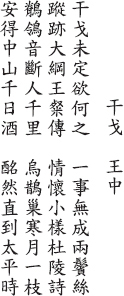222

Wang Chung (fl. thirteenth century) lived in North China when the Mongols began a series of invasions that brought the Sung dynasty to an end. Wang Ts’an (177–217) wrote odes that described the suffering of people during war, and many of Tu Fu’s (712–770) best-known poems described a country in turmoil and his own separation from home. In the Book of Odes the wagtail represents the closeness of brothers who sing out when one of them is in trouble. The magpie is wary of traps and builds its nest at the tops of trees where several branches join. But here it is forced to make do with a single branch. Ts’ao Ts’ao’s “Short Ballad” is also in the backgound: “The moon is bright and stars are few / a magpie flies south / circling a tree three times / on which limb can it rest?” According to Chang Hua’s Powuchih, a Taoist immortal named Chung-shan brewed a wine that could keep a person drunk for three years.
Spears and Shields
WANG CHUNG
Where can I go when spears and shields are clashing
my one success has been to turn my temples white
my steps more or less have followed a Wang Ts’an ode
and my heart feels like a Tu Fu poem
a wagtail can’t be heard a thousand miles away
a magpie spends the winter on a single moonlit branch
where can I get some of Chung-shan’s Three Year Wine
and stay completely drunk until peaceful times begin